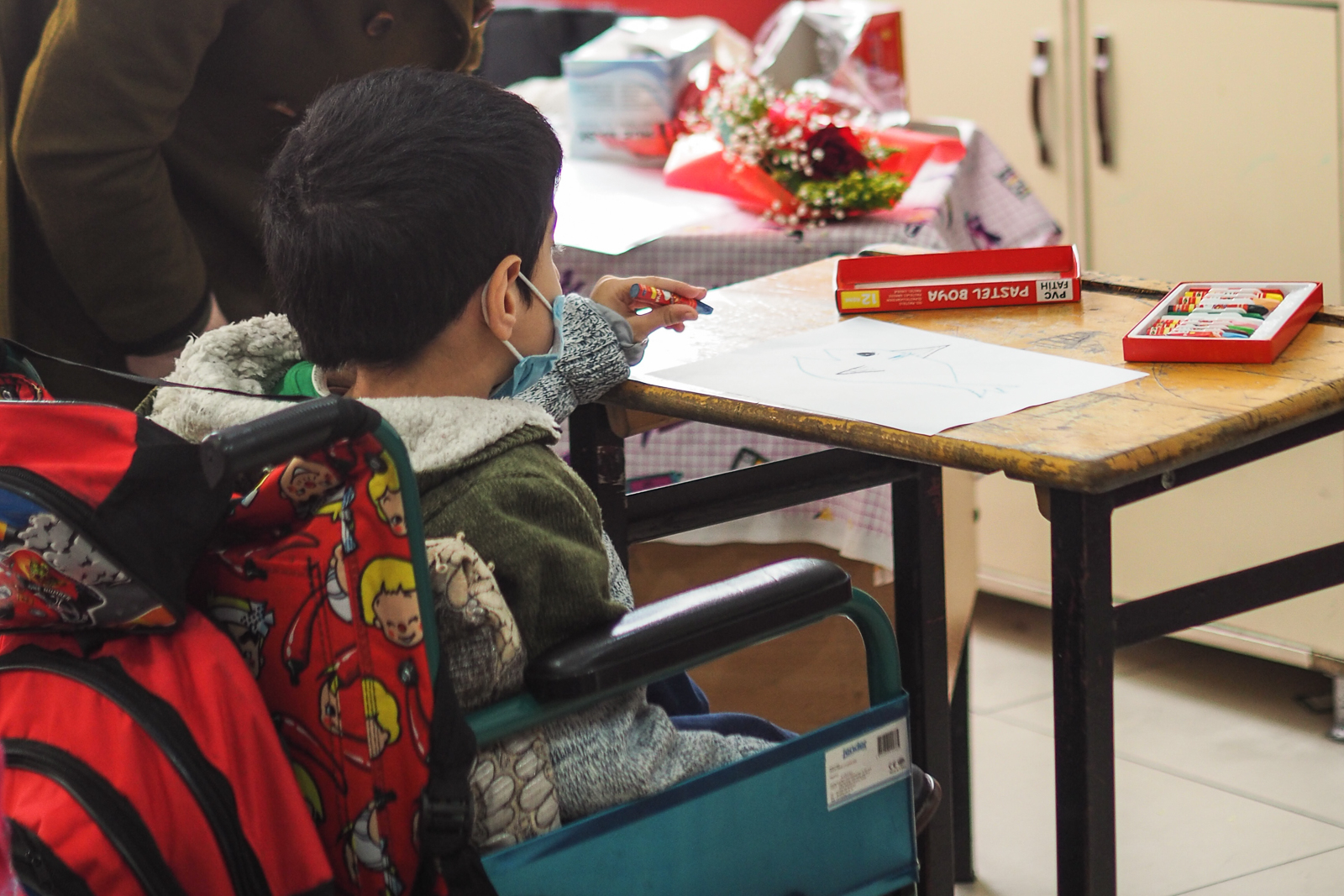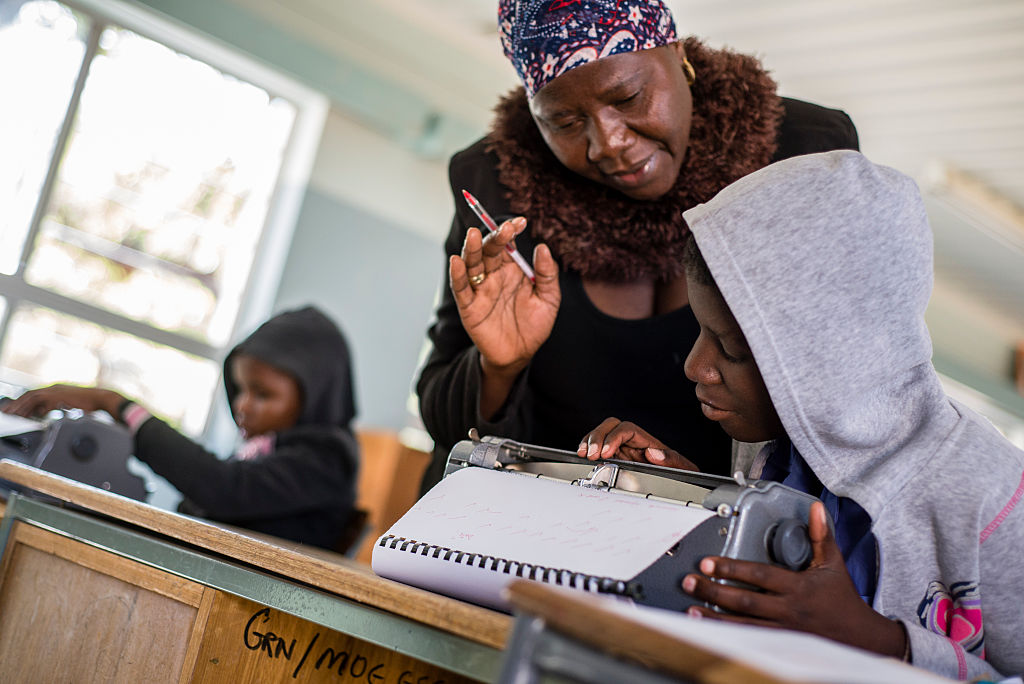
How can you help children with disabilities if you don’t know they exist?
Children with disabilities, Early childhood development, Right to education
Ahead of the Global Disability Summit, we look at how early detection of children with special needs is crucial in providing education and other services.
- On July 24, the United Kingdom government will co-host its first Global Disability Summit with the International Disability Alliance and the government of Kenya. It will bring together more than 700 delegates from governments, donors, private sector organisations, charities and organisations of persons with disabilities.
- Young children with disabilities are particularly vulnerable. In the run-up to the summit, Their News is looking at the challenges they face and what’s being done in different parts of the world to provide them with nurturing care and education.
Emmanuel lives in a village in rural Albania – a two-hour round trip from the nearest city. Like many children under the age of five with a disability, he has little or no local access to services, including healthcare and learning.
His mother Mira says: “I want my son to get better – at least to say two words or to be able sit on a chair. I would go to the end of the world to have my son healed.”
She carries four-year-old Emmanuel in her arms when they travel from their village of Skroska to the city of Librazhd for physiotherapy and speech therapy.
He was only three months old when he was diagnosed with encephalopathy – a disease in which the functioning of the brain is affected by some agent or condition, such as viral infection or toxins in the blood.
He cannot speak or walk. Mira says the most beautiful moments are those when he follows her with his eyes and smiles from time to time.
No one really knew the scale of the challenges for Albanian children with disabilities like Emmanuel because there was so little data available.
So a survey of 13,000 households in Albania was carried out that revealed some startling results. It found that around 8% of children under the age of five are disabled – not the 2% claimed by the government – and a staggering 92% of them do not have access to resources.
Accurate data is crucial when it comes to identifying children in need and providing services, including early learning and pre-primary education.
Early interventions set the path for the future of every child – but are particularly critical for children with disabilities. Too often, however, they are left behind from the start.
Millions of children under five around the world are failed by their governments and international donors, who need to invest urgently in early interventions for disabled children and provide inclusive, quality pre-primary education. If they don’t, these children will be condemned to a lifetime of disadvantages.
Theirworld believes governments and donors should significantly scale up their support for children with disabilities in their first five years – including access to early learning and quality pre-primary education.
For that to happen, all countries need to produce reliable data that tracks the needs and progress of children with disabilities.
In Albania, a combination of lack of data and little help for poverty-stricken families means young children are not being diagnosed until later in childhood, which hampers their chances of reaching their full potential.
A UNICEF study of children with disabilities in Albania in 2014 found that 63% in rural areas were attending preschool but only 34% in urban areas.
But much of the data in Albania around children with disabilities is very contradictory, said Eljona Boce Elmazi, national director of WorldVision Western Balkans. World Vision carried out the households survey with Save the Children.
A striking 92% of all disabled children are not getting access to the specialised services they need to reach their full potential, which is concerning. Eljona Boce Elmazi, national director of WorldVision Western Balkans
“As a country, we were not properly understanding how many children with disabilities were in Albania.
“There was some data of course from the government but this was based mainly on the number of children who had been certified by medical commissions.
“This meant that many of the disabilities that were acknowledged and data gathered was mainly relating to physical impairments.
“But this process does not allow anyone to capture children who were having emotional and psychological disabilities, such as autism. This was one of the downsides of the data captured by the government.”
Albania has transformed from the poorest country in Europe in the early 1990s to an upper-middle-income country, according to the World Bank. But huge numbers of children with disabilities are in danger of being left behind.
“A striking 92% of all disabled children are not getting access to the specialised services they need to reach their full potential, which is concerning,” said Elmazi.
“Early identification remains one of the biggest challenges that the country has. The parents are not aware of the structures that are out there to help them determine whether their young children have a disability, so very often it is missed.
“Parents have to go from the villages to the city to have their young children screened or assessed. The parents of these children have a profile of having a low level of education, many are unemployed – especially mothers who have to look after the children and stay at home.”
The lack of early identification and intervention echoes findings from the UNICEF Albania report.
It said: “Despite knowing the importance of prevention and early detection for the support of children with disabilities and for facilitating their optimal development, little progress is made in these two directions … due to the lack of knowledge of parents and professionals.
“As a result, parents had delayed their request for specialised services, leaving no possibility to intervene earlier and the delays in determining the diagnosis have resulted in some cases in permanent disability.”
WorldVision’s research looked at children from the ages of two to 17. The survey did not include younger children due to the difficulty in assessing whether there is a disability or a developmental delay.
“We found that 8% of children under five are disabled, some of them with many disabilities,” said Elmazi. “It is a high number when it’s compared to the official government figures which show it’s around only 2%.
“We launched the data survey one year ago and the government is not happy of course. But we felt that by just looking at disability from the medical point of view did not allow us to capture a large number of children who were suffering emotional and psychological disabilities that prevent them from reaching their full potential.
“The survey covered all the developmental areas of a child – from hearing, seeing, walking, mobility, the emotional aspects, how they communicate, their sociability, aggressiveness etc. It was a very comprehensive way of looking at the development of a child.”
The research also found that 66% of families with a disabled child have a monthly income of about $365 for a household of four to six people.
“How are these parents expected to provide expensive therapies for their children, never mind the transport costs?” asked Elmazi
“For many parents with disabled children there are clearly not enough resources for parents trying to do their best in difficult circumstances where money and transport is an issue.”
Despite the bleak figures, WorldVision is leading the way in laying out plans to tackle the issues.
“There is not one solution to this,” said . “Firstly, we need to build services [at a community level] because these children are not being served. If the child can not travel to where the services are, then the services have to go to them.
“Secondly, it’s about solidarity. We need to welcome diversity and stop discrimination in the community – for instance letting children playing with their peers.
“Thirdly, to start empowering the parents and the children to thrive. To help them to become self-sustained, we should be looking at independent living.
“But right now, we are facing the challenge of a deeply grave situation. If we don’t take action now, we are going to see disastrous results.”
Theirworld’s #5for5 campaign and our work on early childhood development is supported by the Conrad N. Hilton Foundation.
ALSO IN OUR SERIES

More news

Technology has the power to expand education for children with disabilities
